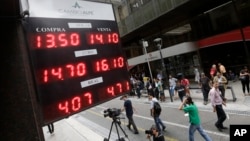Argentina's peso plunged more than 26.5 percent on Thursday, after the country's new government floated the currency as part of a slew of free-market reforms aimed at revitalizing the stagnant economy.
It was the sharpest one-day devaluation in decades. The big winners were farmers in the sprawling Pampas grains belt who will start getting paid in stronger U.S. export dollars, while average consumers risk seeing their purchasing power fall.
The peso opened at 14.00 per U.S. dollar and closed at 13.38. Less than 24 hours before, in announcing the new policy, Finance Minister Alfonso Prat-Gay said 14.2 per dollar was a reasonable expectation for the post-devaluation peso.
The central bank issued a statement saying it did not intervene in the foreign exchange market to support the peso on Thursday, the first day of its new "dirty float" policy under which the bank may buy pesos if the currency weakens too much.
Mauricio Macri was elected president last month after promising free-market solutions to Argentina's long list of economic woes. Thursday was the first test of his policies. His predecessor, two-term President Cristina Fernandez, believed in heavy state control of the economy.
‘Reality check’
"This is part and parcel of the much-needed reality check that Argentina is getting with its new president," said Charlie Robertson, global chief economist at Renaissance Capital.
"Large devaluations tend to be pretty disruptive and negative for gross domestic product in the short-term, but much more helpful in the long-term," Robertson added.
Indeed, Argentines could get hit by higher inflation before Macri's policies achieve their goal of revitalizing the economy.
The opposition, loyal to Fernandez, warned the devaluation would dilute wages. Unions were already set to demand raises in line with inflation expectations of about 30 percent next year.
The prices of many goods in Argentina are set according to the peso's value against the dollar. Supermarket prices shot up in early December in anticipation of the devaluation.
Farmers win
The central bank is scrambling for the reserves it will need to keep up with dollar demand. To help, the government has sealed a deal with grains exporters to liquidate $400 million of produce per day over the next few weeks.
Local and foreign investors might also be inspired to bring money back to the country if Macri's reforms succeed.
"Exports of agricultural products will help bring in U.S. dollar inflows but the key will be the return of flight capital and foreign investment," said Gary Kleiman, of Kleiman International Consultants in Washington.
In a return to policies that prevailed before Fernandez implemented capital controls, Argentines now have full access to U.S. dollars.
Fernandez imposed protectionist measures as part of her program of strengthening the social safety net and helping local industry. She left the nation with double-digit inflation, a yawning fiscal deficit and thin dollar reserves.
The local stock index opened 1.67 percent higher on Thursday, though it later reversed course and was down 0.66 percent in afternoon trading. Wall Street generally agreed Macri's reforms would reduce distortions in the economy.
"The benefits, however, may not materialize until well into next year," Capital Economics said in a note to clients.





